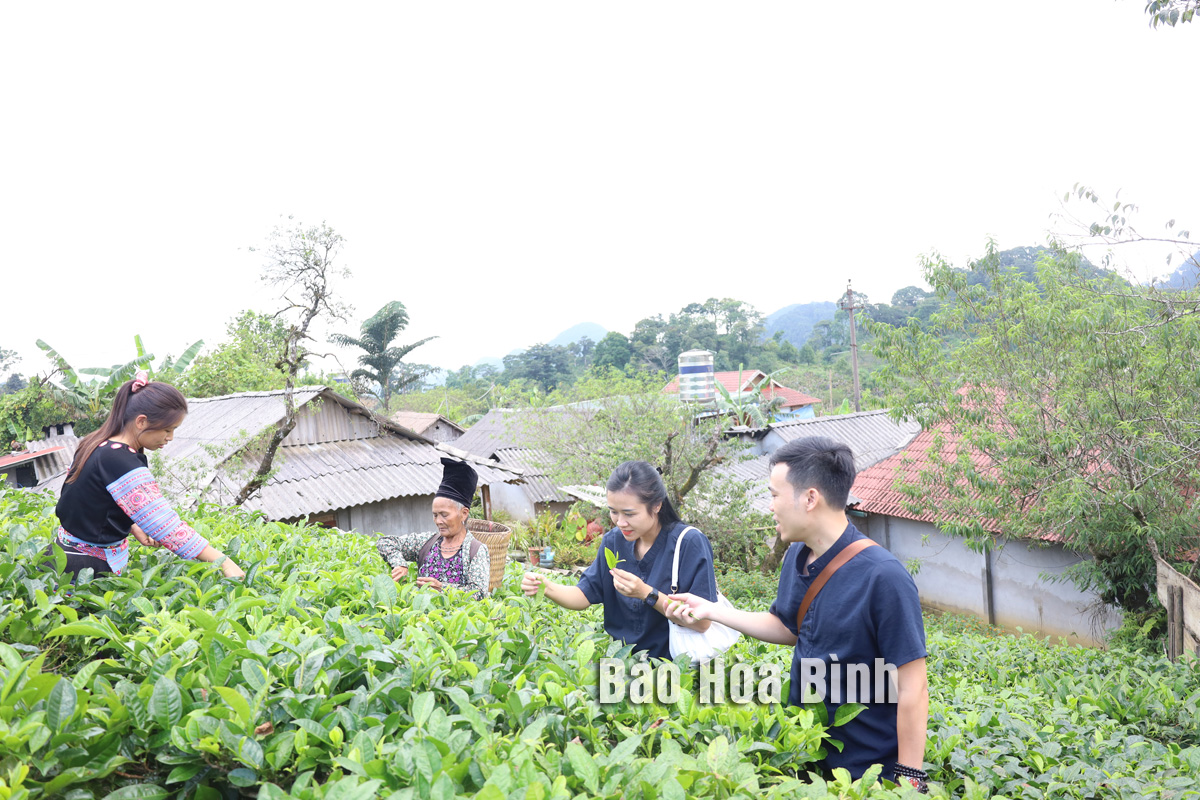
People in Cha Day village in Pa Co commune, Mai Chau district of Hoa Binh province, have been taking advantage of natural conditions and traditional cultural values to develop community-based tourism which has helped improve their quality of life.
Tourists join in picking tea leaves with local people
in Cha Day village.
In the past, Mong people in Pa Co commune mostly
earned their living by growing corn, paddy and raising cattle and poultry. Six years ago, Phang A Pao, a local resident,
was the first person to start community-based tourism model in the commune. Pao, who is now head of a group of farmers who
provide Mong homestay service, said that since he started his tourism business,
he has learnt many things. He understood that preserving the natural
landscape and cultural identity can help people from ethnic groups to develop,
and escape from poverty.
So far, ten families in the village have joined
in developing community-based tourism in association with preserving and
promoting tangible and intangible cultural values.
In the village, the homestay service providers
have still preserved traditional houses made of natural materials and decorated
in the style of Mong people. New tourism products have been exploited such as
cultural space of the Mong people, traditional night market, and camping
combined with cloud watching in the mountains, which helped attract domestic
and international visitors.
Anline, a visitor from France, said that she was
impressed when she visited "Mong Space" and was told interesting
stories about traditional costumes, patterns on fabric, and long preserved
items. She was also guided to make paper, paint with beeswax and relax with
herbal bath.
After 6 years of implementing the
community-based tourism models, Cha Day village has become one of the popular
destinations for domestic and international tourists. While running tourism
business, households in the village are highly aware of the importance of
preserving local culture, particularly traditional costumes, cuisine, and
festivals.
Up to now, the "Homestay Mong and
experience Pa Co agriculture" has gathered 35 members with six homestays.
Houses that provide homestay service got an average annual income of 100
million VND (4,000 USD).
Located just a 20-minute drive from Hoa Binh City, Ora Hill Farmstay & Glamping Hoa Binh is a captivating new destination nestled in Mo hamlet, Bình Thanh commune, Cao Phong district. Combining farming with leisure, this tranquil retreat is perfect for those seeking balance, joy, and an immersive experience in the expansive beauty of nature.
Muong Bi - Tan Lac is renowned as one of the four famous Muong regions in Hoa Binh province. Blessed by nature with a favourable climate and stunning landscapes, Tan Lac holds great advantages for tourism development. The local tourism industry has made remarkable strides in recent times thanks to the attention and support from the local authorities and sectors.
With its strategic location, well-developed transport network, and diverse soil and climatic conditions, Hoa Binh is emerging as a must-visit destination in Vietnam's northwestern tourism corridor. The province boasts numerous attractions, including the Kim Boi hot springs (Kim Boi district), the Dau Rong cave complex (Cao Phong), the Mai Chau valley (Mai Chau), and the iconic Hoa Binh hydropower plant.
The northern mountainous province of Hoa Binh has been listed among the 71 most beautiful places to visit worldwide by the prestigious US travel magazine Condé Nast Traveller.
Hoa Binh province’s rich natural and cultural resources position it as a prime location for developing community-based tourism (CBT). In recent years, support from central and provincial policies, as well as assistance from non-governmental organisations, have encouraged local ethnic minority and mountainous communities to actively engage in the sector.



